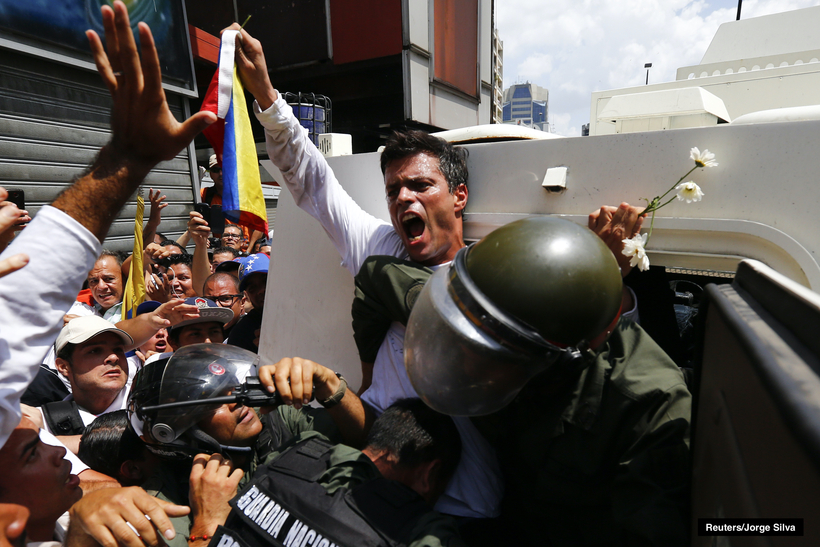This month Americans got a taste of something Venezuelans know well: the undermining of election results. In Venezuela, though, with 80% of households in a state of food insecurity and 85% of necessary medicine unavailable, the stakes are far higher. Premiering November 11 at the weeklong DOC NYC film festival, A La Calle (To the Street), directed and produced by Nelson Navarrete and Maxx Caicedo, offers a firsthand account of Venezuelan president Nicolás Maduro’s transformation of the government from democracy to dictatorship. It also documents the people’s efforts to reclaim control of their country.
The filmmakers spent three years recording exclusive interviews with key opposition figures Leopoldo López, whose 2014 arrest and imprisonment inspired a national movement; Nixon Leal, a grassroots activist tortured by Maduro’s forces; and Federica Dávila, a medical student and co-founder of a nonprofit dedicated to treating victims of protest violence. Through their eyes viewers can see the decline of a country that was once one of Latin America’s wealthiest, and is now on the brink of economic collapse.

Oil-rich Venezuela, in the early years of Hugo Chávez’s presidency (he was democratically elected in 1999), prospered off booming oil prices. Chávez’s mismanagement of the country’s wealth—Venezuela had a deficit of 18.6 percent of GDP in the middle of 2012’s oil boom—didn’t become apparent until his death, in 2013, when Maduro assumed power as his successor. Fast forward a few years. Following a steep decline in oil prices, the economy crashed, the nation raced toward poverty and hyperinflation, and Maduro strengthened his political hold.
By 2019, Venezuela’s GDP growth rate had fallen by 67 percent (compare this to a 29.8 percent fall in the U.S. during the Great Depression). People eat out of garbage cans. A man trades stacks on stacks of bills for a box of pasta, a bag of rice, and a few corn kernels. Unable to withdraw cash from their bank accounts, people turn to bartering: a block of cheese for a haircut. “In Venezuela, we don’t live,” one person says, “we survive.” Meanwhile, Maduro rigs a 2019 election, securing his presidency until 2025. His military fights the increasing crowds of protestors, firing on its own people. At the same time, he refuses to accept foreign help, and starving protestors watch, tantalized, as trucks full of aid are blocked just on the other side of Venezuela’s border with Colombia; “Better safe than sorry,” Maduro says nonsensically in a televised speech.
“In Venezuela, we don’t live, we survive.”
We’ve seen all this before. When Maduro eliminates checks and balances, Putin’s Russia, the Crown Prince’s Saudi Arabia, and Erdogan’s Turkey come to mind. When he exerts control over the judiciary and military, we think of Syria and Honduras. And in threatening protestors, he recalls the Philippines’ Duterte. Maduro’s shady politics can’t evade the sharp focus of a camera in the street.
This fall, investigators appointed by the U.N. Human Rights Council implicated Maduro of Crimes Against Humanity. This October, after 18 months of exile in the Spanish embassy in Caracas, Leopoldo López, fearing for his life, escaped to Spain. And the opposition leader Juan Guaidó, recognized by 50 nations as the legitimate head of state, continues to fight with the backing of a virtually unanimous public. Maduro has yet to loosen his grip. —Julia Vitale
Visit alacallefilm.com to watch the film
